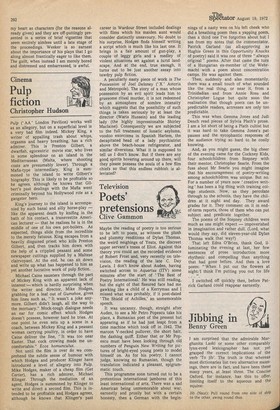Cinema
Pulp fiction
Christopher Hudson
Pulp (` AA ' London Pavilion) works well as an allegory, but on a superficial level is a very bad film indeed. Mickey King, a writer of appalling trash about whips, orgasms and heavy breathing, has a rich admirer. This is Preston Gilbert, a dwarfish, egocentric movie star, who lives in some splendour on an island in the Mediterranean (Malta, where shooting costs are presumably lower). Through a Mafia-type intermediary, King is summoned to the island to write Gilbert's biography. This is likely to be profitable so he agrees, although he knows that Gilbert's past dealings with the Mafia went criminally beyond his Hollywood role as a gangster hero.
King's journey to the island is accompanied by such banal and silly horse-play — like the apparent death by knifing in the bath of his contact, a transvestite American lecturer — that he realises he is in the middle of one of his own pot-boilers. As expected, things slide from the incredible to the merely fatuous. King escapes from a heavily disguised priest who kills Preston Gilbert, and then tracks him down with the help of a crippled peasant and some newspaper cuttings supplied by a Maltese clairvoyant. At the end, he can sit down and write up what has happened to him as yet another lucrative work of pulp fiction.
Michael Caine saunters through the part of Mickey King with an apparent lack of interest *— which is hardly surprising when the writer and director, Mike Hodges, grabbing for a leaf out of Gumshoe, gives him lines such as, "It wasn't a joke anymore. Gilbert didn't laugh, all the way to the mortuary." Mock-tough dialogue needs an ear for comic effect which Hodges doesn't possess, however hard he tries. At one point he even sets up a scene in a coach, between Mickey King and a peasant woman carrying poultry, in order to have Caine deliver the line, "It was too near Easter. That cock crowing made me uncomfortable." Ecce homunculus.
Not until the film is over do we comprehend the subtle sense of humour with which Hodges and producer Klinger have introduced a level of allegory into Pulp. Mike Hodges, maker of a cheap film (Get Carter), has a rich admirer, Michael Klinger. Through the mediation of an agent, Hodges is summoned by Klinger to write and direct a second film. This is intended to be profitable and Hodges agrees, although he knows that Klinger's past career in Wardour Street included dealings with films which his maiden aunt would consider distinctly unsavoury. No doubt to his surprise, Hodges finds himself writing a script which is much like his last one. It brings in a fair amount of gun-play, a couple of leggy girls and a medley of violent situations set against a lurid landscape. And at the end, true enough, it turns out to be just another essay into tawdry pulp fiction.
A peculiarly nasty piece of work is The Possession of Joel Delaney (` X ' Astoria and Metropole). The story of a man whose possession by an evil spirit leads him to gruesome ritual murder, it is not redeemed by an atmosphere of sombre intensity which suggests that the possibility of such things is taken seriously by at least the director (Waris Hussein) and the leading lady (the highly impressionable Shirley Maclaine). Consequently we are subjected to the full treatment of lunatic• asylums, voodoo exorcisms in Spanish Harlem, the decapitated head of a lady psychiatrist above the beach-house refrigerator, and similar diversions. What it is supposed to tell us I don't know. But if there are any good spirits hovering around up there, will they please possess the souls of a few film chiefs so that this endless rubbish is alleviated?
































 Previous page
Previous page